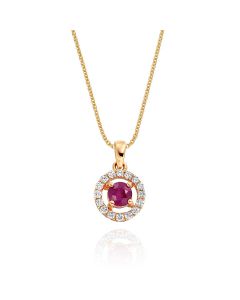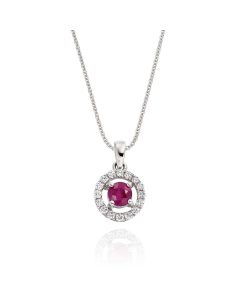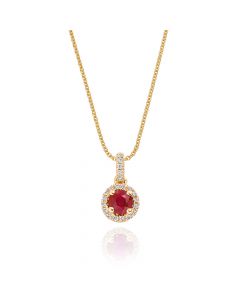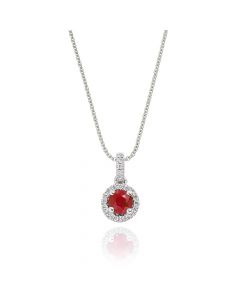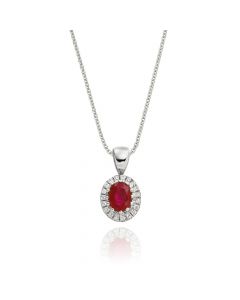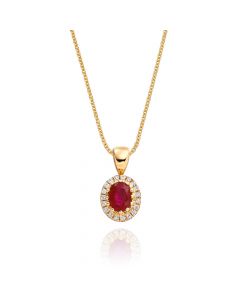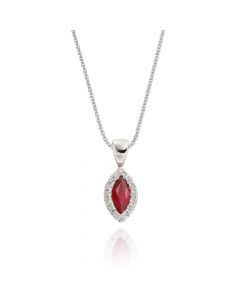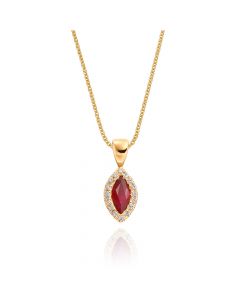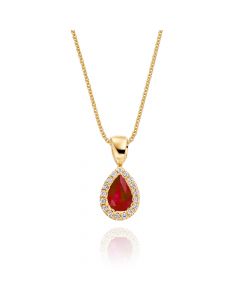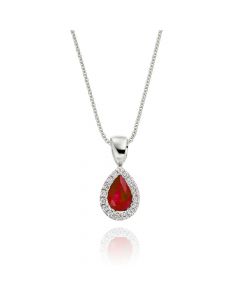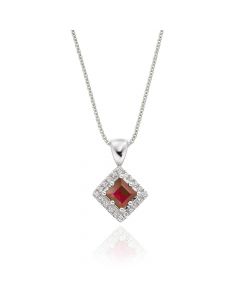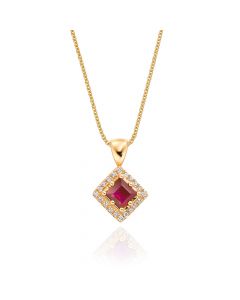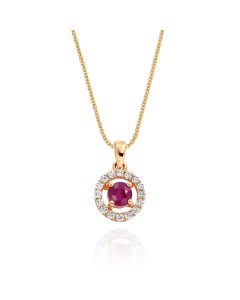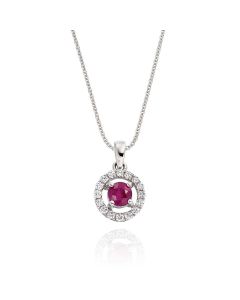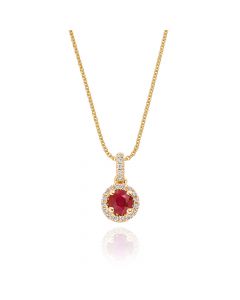Ruby Ring 0.35ct Round Ruby & 0.09ct Diamonds 9K White Gold
ITEM REF: VN148RU/638W9
This dainty Ruby Ring features a round-cut red ruby which is beautifully complemented by a halo of diamonds. The ruby has a diameter of 4mm and weighs 0.35ct; the diamonds weigh 0.09ct. This stunning ruby ring is crafted in a minimalist 9K white gold setting.
| Birthstone | July Birthstone | |||||||||||||||||||||||||||||||||
| Diamond Weight | 0.09ct
|
|||||||||||||||||||||||||||||||||
| Diamond Quality | Colour G/H, Clarity SI
Diamond Guide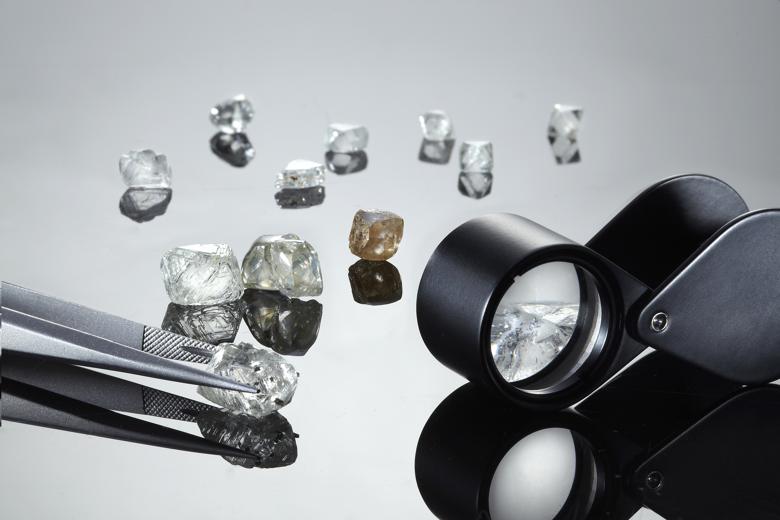 At Diamond Treats:
THE FOUR C's:CutCut is a very important quality factor, and probably the most challenging, of the four Cs to understand. The brilliance of a diamond depends heavily on its cut, which give a diamond that brightness that seems to come from the very heart of the diamond. The quality of the cut is a result of just the right angles, proportions and finish of the diamond. It is the quality of the cut that gives a diamond its ability to handle light, which in turn leads to its dazzling brilliance and fire. ClarityAlmost all diamonds contain some inner flaws, or inclusions, that occur during the formation process. These inclusions are the ‘birthmarks’ of the diamond. The visibility, number and size of these inclusions determine what is called the clarity of a diamond. The inclusions interfere with the path of light through the diamond and therefore, diamonds that contain a lower degree of these inclusions create more brilliance. The better the clarity of the diamond the more expensive the diamond will be. Most inclusions in a diamond are so small that it is not possible to see them with the naked eye.
ColorA diamond is graded based on its lack of colour. The less colour, or the more colourless a diamond is, the greater its value and its visual appeal. Diamond colour grades range as follows:
Colourless and Near Colourless diamonds are the most desirable since they allow the most refraction of light (sparkle). Carat (weight)Diamond Carat is the unit of weight by which a diamond is measured As diamond carat weight increases so does its value, however it is important to note that as larger diamonds are rarer than smaller ones, the value of a single diamond increases exponentially with its carat weight. Often the carat weight of a diamond is used when talking about the diamonds size. Although this is not strictly correct, naturally, as the weight of a diamond increases, so does its size, and for this reason people use Carat weight as an indication of size. The table below shows the approximate diameter of a round and princess cut diamond as the carat weight changes:
|
|||||||||||||||||||||||||||||||||
| Dimensions | 6.3mm | |||||||||||||||||||||||||||||||||
| Gemstone Grade | AA+ | |||||||||||||||||||||||||||||||||
| Gemstone Details | Ruby 4.0mm
Gemstone GuideSAPPHIRESSapphire is mostly thought of as a blue gemstone, though many other colours are available. Pink-orange sapphires can be very valuable, and colourless sapphire resembles diamond. All sapphires are crystalline aluminium oxide (alumina) and the various colours are the result of trace metal impurities such as chrome, which is responsible for their pink hues, and titanium and iron, which gives blue sapphires their colour. Sapphires are almost as hard as diamond, and are used mainly in jewellery. Kate Middleton’s blue sapphire engagement ring, which was once the engagement ring of Princess Dianna, is said to be worth £300,000, but the 563 carat Star of India is probably the most valuable sapphire in the world. Sapphire is also an important material in science and engineering; it is used in high power electronics and in lasers. The sapphire is the birthstone for the month of September. View our Sapphire jewellery collection... EMERALDSEmeralds are beautiful gemstones known for their distinctive verdant green colour. They are a crystalline form of beryl, a beryllium-aluminium-silicate mineral, and their greenness is caused by traces of chrome and vanadium. They aren’t hard like diamond and they may have many flaws which make them relatively brittle, though flawless emeralds can be highly valuable. Fine transparent emeralds can be more valuable than diamonds. Emeralds make excellent jewellery and have been revered for thousands of years and are said to have been a love of Cleopatra. Elizabeth Taylor’s emerald and diamond necklace given to her by Richard Burton as a wedding gift is worth over $6 million, though even inexpensive emerald jewellery can look stunning. Emerald is the birthstone for the month of May. View our Emerald Jewellery collection... RUBIESRubies are blood red gemstones that are physically similar to sapphires being the same crystalline form of alumina, but with a relatively high level of chrome incorporated in the crystal matrix. The special red colour is the result of luminescence, which gives this precious gemstone its characteristic lustre. The value of a ruby depends to a large extent on its colour, with vivid dark red rubies being the most highly prized. Rubies are used in many different forms of jewellery either as a single stone or with other gemstones. Ruby jewellery has found favour amongst the rich and the famous and the Queen’s personal ruby collection, which includes the 353 carat Timur ruby, is said to be worth over £50 million. In engineering rubies are used in lasers. The first ever laser used a ruby rod to generate a high energy laser beam. Ruby is the birthstone for the month of July. View our Ruby Jewellery collection... GARNETSThe commonest colour of garnet gemstones is red, but they can occur in a wide range of colours including orange, yellow, green, purple, pink, blue and even black. While all garnets are crystal forms of various metallic silicates, the metal combinations vary. The five main kinds of garnet are grossularite, pyrope, andradite, almandite, and spessartine; some gemstones are mixtures of these. Garnets are the most abundant gemstones found on the planet. The name garnet means ‘seed’ and they are so called as they have the appearance of seeds of pomegranate. Garnets make wonderful jewellery. They are used in all forms of jewellery and can be relatively inexpensive. They were a favourite in ancient times, and are historically one of the most traded gemstones. Garnets are used in engineering as an abrasive. Garnet is the birthstone for the month of January. View our Garnet Jewellery collection... CITRINESCitrines are yellow gemstones. The name citrine means the colour of lemons, and the stones can have a wonderfully delicate yellow hue. The stone is a type of quartz which contains trace quantities of iron. The iron gives the stone its distinctive colour which can range from light yellow through to brown. As citrine is a semi-precious gemstone, citrine jewellery is more affordable even though it can look exquisite. Some famous owners of stunning citrine jewellery include Queen Maxima of The Netherlands and Queen Beatrix. In ancient folklore citrine jewellery is associated with happiness, wisdom and peace. Citrine is the birthstone for the month of November. View our Citrine Jewellery collection... AMETHYSTSAmethysts are violet gemstones that are a kind of quartz with their distinctive colour produced by the presence of iron and aluminium. The name comes from the Greek word amethystos meaning “not intoxicated” as it was believed that amethysts protected the wearer from seduction. Some the other powers attributed to it include protecting crops, driving out evil spirits, and even protecting the wearer against snakebites. Many consider that amethysts are the most beautiful of all quartz gemstones. Their colour can be adjusted by heat treatment and exposure to radiation. Heating darkens the colour while exposure to sunlight can make it lighter; it can also be converted into citrine. Amethysts are used in a wide range of jewellery. Famous examples include the Crown Jewels and the Cartier Paris amethyst necklace made in 1941 for the Duchess of Windsor. Amethyst is the birthstone for the month of February. View our Amethyst Jewellery collection... TOPAZTopaz gemstones are mostly yellow in colour, though they can occur in a wide range of colours including grey, orange-red, brown and blue. They are a crystalline form of a fluorine containing alumino-silicate. Huge crystals of topaz can occur in nature and, as there tend to be few flaws, large gemstones can be cut from them. One of the largest of these is the faceted El-Dorado Topaz which weighs a huge 31,000 carats. Another famous example is the Golden Topaz Sphere which weighs 12,555 carats. Topaz jewellery is popular as the gemstone is relatively inexpensive, yet it is beautiful and hard wearing. Clear topaz is sometimes used as an inexpensive alternative to diamond, though blue topaz is popular. It is an ideal choice for those looking for large beautiful affordable stones. Topaz is the birthstone for the month of November. View our Blue Topaz Jewellery Collection... PEARLSUnlike other gemstones, pearls are made by living oysters and other molluscs. The creature, on sensing a foreign body in its shell, protects itself by coating it with the same materials it uses to make its shell. The materials are a form of calcium carbonate called aragonite and a kind of glue made from proteins called conchiolin. Natural pearls occur in this manner when the mollusc detects a parasite, and cultured pears are induced by implanting a tiny bead into the mollusc. Pearls are said to make the most feminine of all jewellery and they have been revered since as long ago as the fifth century BC. While natural pearls can be expensive, cultured pearls are relatively affordable. Their value depends on their colour, lustre, size, shape and on how flawed they are. While white pearls are some of the most desirable, pearls may also be pink, blue, green and even black. The most valuable pearl necklace in the world is “la peregrine” which was last sold for $11.8 million. In 1969 it was given to Elizabeth Taylor by her husband Richard Burton who paid just $37,000 for it proving than pearls can be even more than beautiful jewellery, they can also be an excellent investment. The Pearl is the birthstone for the month of June. View our Pearl Jewellery collection...
|
|||||||||||||||||||||||||||||||||
| Metal | 9K White Gold |




